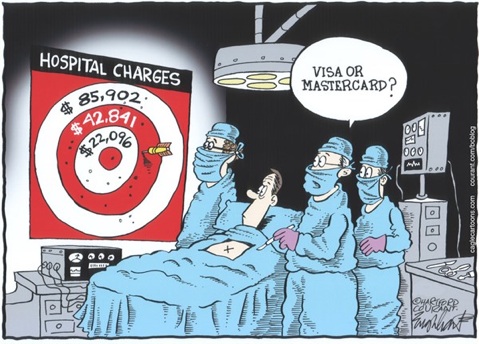We All Need Health Care Now
National Health Insurance Saves Money in the Long Run

Happy birthday, Medicare, which celebrates 49 years of service today. In a 1995 essay in the journal Health Affairs, Robert Ball wrote that those who helped develop Medicare saw it as a first step toward universal national health insurance. Covering only seniors was a fallback position because that is all that could be expected to pass Congress at the time. Sound familiar?
Medicare is not perfect, but political fights over ideology and special interest profits have blocked improvements that would increase efficiency and effectiveness. Otherwise by now we would have national health insurance, have better outcomes, have no uninsured nor financial barriers to care, and would be spending much less on administrative overhead, like the rest of the industrialized world.
The Medicare Advantage program — your Medicare dollars given to private insurers who of course need to make a profit — promised reduced cost and expanded coverage, but instead increased costs (15 percent more costly to the Medicare fund than traditional Medicare) and decreased choice of physicians.
Part D, subsidized drug prices but prohibited negotiating prices or importation, thus keeping prices artificially high.
And now, instead of folding Medicare, Medicaid, employer-provided insurance, and individual insurance into one Medicare-for-all plan, we have added Obamacare, which multiplies the administrative complexity and inefficiency of both public and private insurance plans. It still leaves over 30 million people without health insurance with an indefinite wait time for all but emergency room care.
Don’t misunderstand the above as a call for repealing Obamacare, which has provided affordable coverage to millions more people. My point is that if we could get beyond the ideological fighting, beyond corporate desire for ever-increasing profits and look only at efficiency and effectiveness, we could have national health insurance for everyone at no additional cost and save money now and in the long run.
Logically, fiscal conservatives should embrace a reform such as Medicare for all because, factually, it would save all of us money — government, individuals, and businesses. But it is hard to even get some progressive politicians who think Medicare for all is a good idea to champion it for fear of conservative backlash. The time is not right, some say.
Logic and facts may not be in fashion, but the time is right to organize, organize, organize. So if you think Medicare for all is a good idea, support one of the many groups backing the idea. When the parade of supporters gets big enough, the politicians will scramble to get to the front.
In the end, it is up to individuals, businesses, medical professionals, and organizations of all types to act. The movement exists. You need to join it to make it succeed.
Peter Conn is outreach coordinator of Health Care for All — Santa Barbara.



